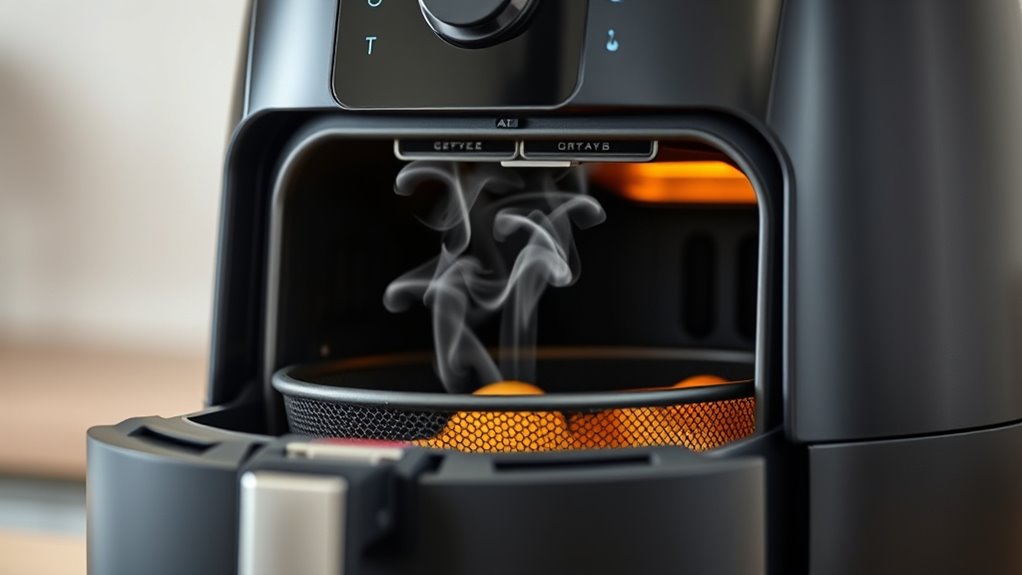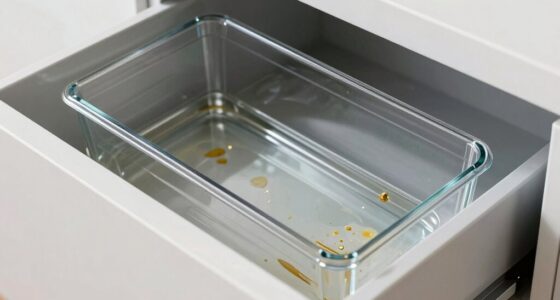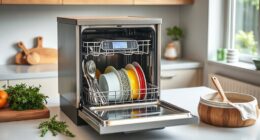If your air fryer is smoking, chances are grease buildup, food particles, or sugary sauces are causing it. Overcrowding, improper food placement, or overfilling can restrict airflow and lead to burning. Turn off and unplug your device, clean the interior, and avoid high-fat foods that splatter. Using the right oils and maintaining proper temperatures helps prevent smoke. Curious to find out more tips on keeping your air fryer smoke-free? Keep exploring these solutions.
Key Takeaways
- Grease buildup, food particles, or sugary sauces are common causes of smoke in air fryers.
- Overfilling the basket restricts airflow, leading to burning and smoke.
- Normal initial smoke from heating fats diminishes quickly; persistent smoke indicates a problem.
- Turn off and clean the air fryer immediately if smoke appears to prevent damage.
- Regular cleaning, proper food placement, and using appropriate oils help prevent smoking during use.
Common Causes of Smoke in Air Fryers
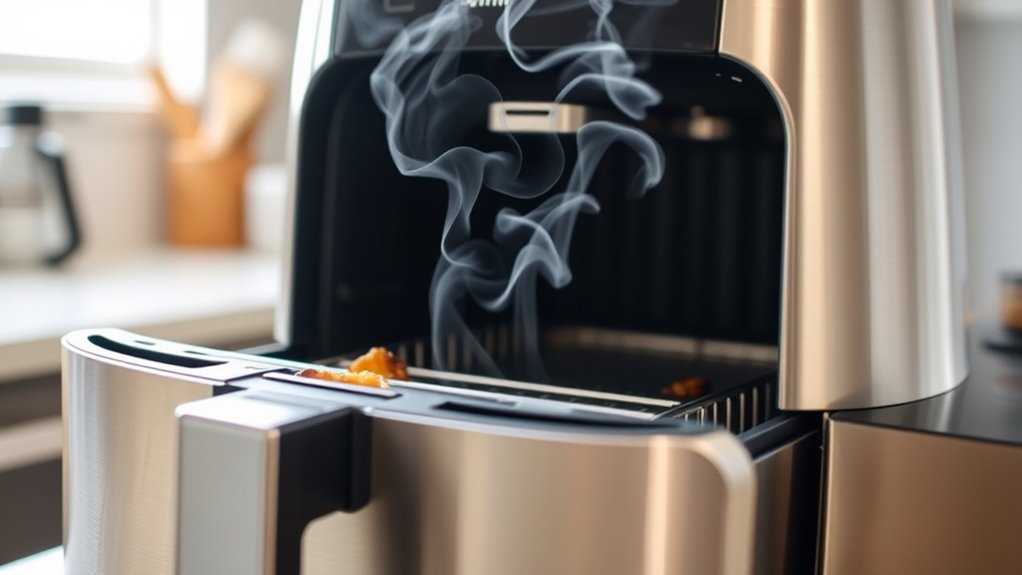
Smoke in your air fryer often results from common issues like grease buildup, food particles, or overuse of sugary sauces. High-fat foods like bacon and sausages can splatter excess oil that drips onto the heating element, causing smoke. Burnt crumbs or batter also land on hot surfaces, producing smoke during cooking. Sugary sauces like barbecue can caramelize and drip, leading to smoke formation. Overfilling the basket restricts airflow, causing food to burn and smoke to develop. When food contacts or touches the heating element, it scorches and creates smoke inside the appliance. Regularly cleaning grease buildup, avoiding overfilling, and preventing food contact with heat sources can help reduce smoke and keep your air fryer running smoothly. Understanding the importance of efficient heat transfer can also help troubleshoot and find innovative solutions to common issues like smoking. Additionally, ensuring proper refrigeration cycle operation in appliances related to food storage can prevent spoilage and residue buildup that might contribute to smoke or odors during cooking. Proper maintenance and digital privacy measures are essential to keeping your appliance functioning safely and efficiently.
Recognizing Normal vs. Abnormal Smoke and Odors
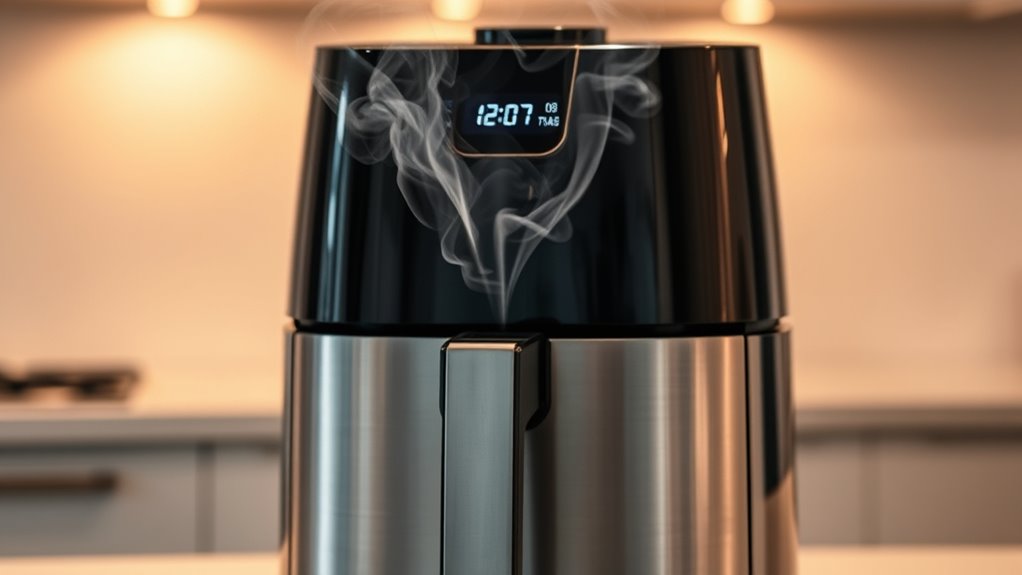
It’s important to tell the difference between normal smoke and signs of trouble when using your air fryer. Light white or gray smoke from heated grease is usually okay, but thick or dark smoke signals potential problems. Recognizing these signs helps you act quickly to prevent damage or safety hazards. Monitoring cooking temperatures can also help prevent excessive smoke and ensure safe operation. Additionally, inspecting for residue buildup around heating elements can help identify causes of abnormal smoke. Regular cleaning and proper maintenance are key to minimizing heat management issues and ensuring your appliance functions safely. Properly maintaining the anti-smoking features of your air fryer can further reduce the risk of smoke caused by grease or food particles accumulating inside the unit. Being aware of cleaning routines can further reduce the risk of smoke caused by grease or food particles accumulating inside the unit.
Normal Smoke Signs
When your air fryer emits a small amount of white smoke during cooking, it’s usually a normal part of the process, especially when fats start to melt. This “normal smoke” often occurs during initial heating as cooking fats and residual oils vaporize. You might see white smoke along with a faint smell, but it typically diminishes after a few minutes. Recognizing these signs helps prevent unnecessary concern: proper maintenance can ensure your appliance functions safely and efficiently. Being aware of flushing mechanisms and proper disposal habits in your household can also help in maintaining your air fryer and other appliances in optimal condition. Additionally, understanding smoke signals can aid in distinguishing between normal and abnormal appliance behavior. Regularly inspecting your air fryer for residue buildup can further reduce the chances of excessive smoke during operation.
Indicators of Overheating
Recognizing the difference between normal and abnormal smoke and odors during air fryer cooking is essential for safe operation. Overheating occurs when the temperature surpasses the food’s smoke point, often producing thick, white smoke and a burnt smell. If you see persistent smoke or a strong burnt odor, it indicates appliance overheating or grease buildup on the heating element. Residual grease or food debris from previous uses can ignite, causing abnormal smoke. A smoke indicator or visible haze signals that your air fryer is running too hot. Regular cleaning to remove grease and debris helps prevent overheating. Keep an eye on the smoke’s appearance and smell—normal steam is harmless, but thick smoke with a burnt smell suggests you need to lower the temperature or clean the appliance.
Immediate Steps to Take When Smoke Appears

If your air fryer starts smoking unexpectedly, act quickly to guarantee safety and prevent damage. First, turn off and unplug the unit immediately. Remove the basket and accessories to inspect for grease, food debris, or burnt residue causing the smoke. Use a damp cloth to wipe down the interior, heating element, and basket, removing buildup that might trigger smoking. Place a slice of bread or add water to the bottom tray to absorb excess grease and reduce smoke during continued use. Additionally, proper cleaning is essential for maintaining optimal performance and safety. Regular maintenance can help prevent issues that lead to smoking. Allow your air fryer to cool completely before cleaning or restarting. Proper inspection and cleaning are essential. Remember, quick action helps prevent fire hazards and extends your appliance’s lifespan. Additionally, understanding how automation technology can influence appliance design highlights the importance of regular maintenance to avoid operational issues. Keeping an eye on filter performance and ensuring all components are in good condition can also reduce the risk of smoke and other malfunctions. Staying informed about SmartCR innovations can provide insights into advanced features that improve safety and efficiency.
How Proper Food Placement Prevents Smoldering

Proper food placement is key to preventing smoldering in your air fryer. When you arrange food correctly, you allow for ideal air circulation, which helps avoid hotspots that can cause burning and smoke. Keep food separated and avoid overcrowding the basket to reduce grease buildup that might drip onto the heating element. Proper positioning ensures food doesn’t touch the heating element directly, lowering the risk of scorching. Position food at appropriate heights within the basket to promote even cooking and prevent juices from pooling or burning. An organized air fryer setup with even food distribution helps maintain consistent heat, reducing smoke production. Additionally, using proper cookware inside the air fryer can help prevent splatters and smoke. Ensuring consistent heat distribution is essential for smoke prevention and optimal cooking performance. Paying attention to food arrangement not only prevents smoldering but also enhances overall cooking results, making your air fryer safer and more efficient. Incorporating proper food placement techniques can further improve airflow and prevent common issues like smoke and uneven cooking. Properly cleaning and maintaining your air fryer also reduces grease buildup, which is crucial for preventing smoke during operation.
The Importance of Cleaning and Maintenance
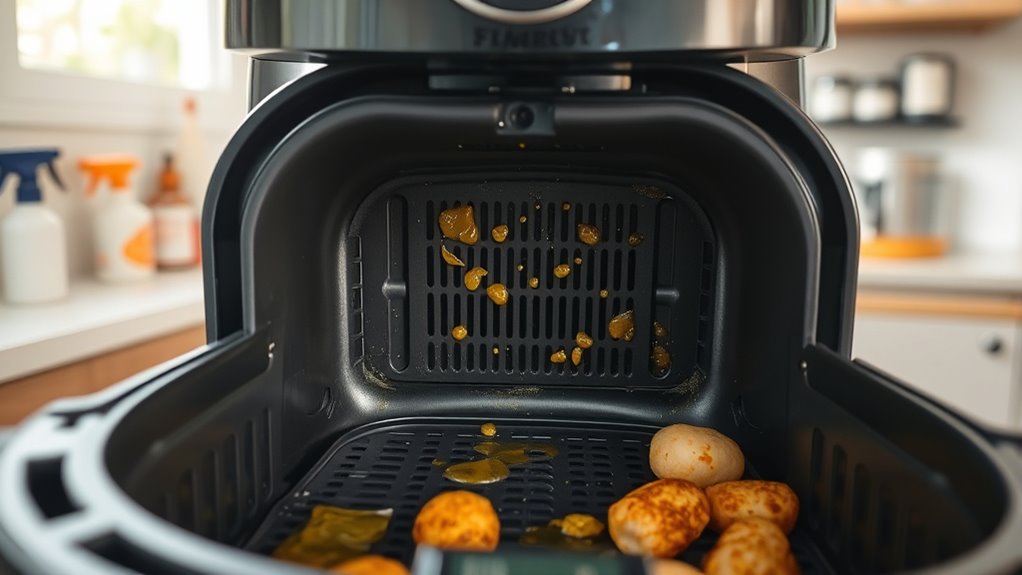
Keeping your air fryer clean and maintained is key to preventing smoke and ensuring it works efficiently. Regularly removing grease, crumbs, and food residues stops buildup that can cause flare-ups. Plus, routine upkeep helps your appliance last longer and perform at its best. Using the right filtration and pump protection measures can further safeguard your equipment from debris and clogs that may lead to smoking issues. Implementing proper cleaning techniques ensures all residues are effectively removed, reducing the risk of smoke caused by residual grease or food particles.
Regular Cleaning Prevents Buildup
Regular cleaning is essential to prevent grease, food debris, and burnt residues from building up inside your air fryer, which can cause smoke during cooking. Without proper residue removal, grease buildup and trapped food particles may ignite or produce smoke when heated. Regular appliance cleaning ensures that baked-on grease and crumbs are removed effectively, reducing the risk of flare-ups. Maintaining a clean basket, tray, and heating element promotes ideal airflow, allowing your air fryer to cook efficiently and safely. Manufacturers recommend cleaning after every use to prevent buildup that can lead to smoking. By staying consistent with your maintenance routine, you minimize smoke sources and extend your appliance’s lifespan. Clean regularly for a safer, more reliable air frying experience.
Proper Maintenance Extends Lifespan
Consistently maintaining your air fryer through thorough cleaning and inspections helps guarantee it functions efficiently over time. Proper maintenance prevents grease buildup and food residue from accumulating on removable parts like the basket and tray, reducing the risk of smoking. Regularly cleaning with warm, soapy cloths removes baked-on grease and crumbs, while soaking removable components ensures a more comprehensive clean. Always dry all parts completely before reassembling to avoid residual moisture that can cause smoke during use. Routine inspections help identify and replace worn or damaged parts, maintaining ideal airflow and preventing overheating. Preventative care extends your air fryer’s lifespan, ensuring it delivers consistent performance and minimizes issues caused by wear and tear or poor maintenance.
Adjusting Temperature and Cooking Times

If your air fryer starts smoking during a cook, adjusting the temperature and cooking times can often resolve the issue. Try a temperature adjustment by lowering the heat by 25°F to 50°F, which helps prevent overheating and reduces grease splatter that causes smoke. Extending the cooking times slightly at a lower temperature allows food to cook thoroughly without burning, aiding in smoke prevention. Always follow the manufacturer guidelines for specific foods, especially those with high fat content like bacon or sausage, which tend to produce more grease splatter. If you notice smoke mid-cook, reducing the temperature midway can help with smoke reduction. Properly managing temperature and cooking times ensures a safer, cleaner cooking process while preventing unnecessary smoke.
Tips for Using Oils and Sauces Wisely
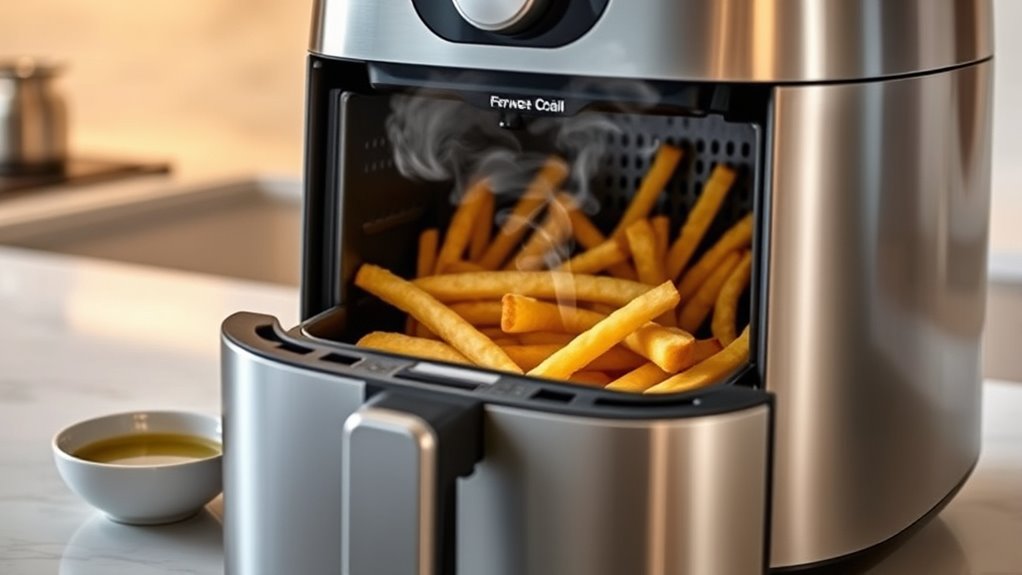
Using the right oils and applying sauces thoughtfully can considerably reduce smoke during air frying. Choose oils with high smoke points—like avocado, refined olive, or grape seed oil—to prevent burning and smoke formation. When adding sauces, do so sparingly and late in cooking to avoid caramelization and excessive smoke, especially with sugary sauces like honey or barbecue. Pat excess liquids dry before cooking to reduce dripping and smoke. Avoid aerosol spray oils, which can accumulate on the heating element, and opt for brushing or pump sprays instead. Keep in mind that sauces with low smoke points or high sugar content can cause burning at high temperatures, increasing smoke. Proper oil application and sauce management are key to a smoke-free air frying experience.
- Use oils with high smoke points
- Add sauces late and sparingly
- Pat excess liquids dry
When to Seek Professional Support

When your air fryer continues to produce excessive smoke despite cleaning and proper use, it’s time to seek professional support. If troubleshooting steps like cleaning or adjusting temperature don’t resolve the smoke, contact manufacturer support. Persistent smoke may signal internal damage or electrical issues needing expert inspection or repair. Do not attempt to disassemble or fix internal parts yourself, as this could void your warranty or cause further damage. Recognize when to ask for technical assistance to ensure safety and proper functioning. Use the table below to understand scenarios requiring professional help:
| Issue | Action Needed | Priority |
|---|---|---|
| Smoke persists after cleaning | Contact manufacturer support | High |
| Electrical issues suspected | Seek professional repair | High |
| Internal damage suspected | Schedule authorized repair | High |
Frequently Asked Questions
How Can I Stop My Air Fryer From Smoking?
If your air fryer is smoking, first turn it off and unplug it to prevent further issues. Remove the basket and clean away any grease or food debris causing smoke. Place a slice of bread or water in the bottom to absorb excess grease. Make certain your food is dry, not overcrowded, and positioned away from the heating element. Adjust the temperature and cooking time to lower settings if needed.
Is It Normal for My Airfryer to Smoke?
Did you know that up to 20% of new air fryers emit some smoke during initial use? It’s normal for your air fryer to produce a small amount of white smoke initially, as manufacturing oils burn off. Minor smoke during cooking, especially with fatty foods, is common. However, if smoke persists or worsens, it might indicate grease buildup or debris, so regular cleaning and proper ventilation are essential to keep it running smoothly.
How Do I Clean My Air Fryer so It Doesn’t Smoke?
To clean your air fryer so it doesn’t smoke, start by removing the basket, tray, and accessories, then soak them in warm, soapy water. Wipe the interior, including the heating element and fan, with a damp cloth to remove grease. Clean the bottom tray and drip pan regularly, and scrub hard-to-reach areas gently. Make sure all parts are completely dry before reassembling to prevent moisture from causing smoke.
What Causes a Deep Fryer to Smoke?
When your deep fryer smokes, it’s usually because excess oil or grease has built up on the heating element or inside the fryer. Cooking high-fat foods like bacon or fried chicken releases grease that can splatter and burn, creating smoke. Overfilling the basket reduces airflow, causing grease to burn, and running the fryer at too high a temperature speeds up smoke production. Regular cleaning and proper temperature control can prevent this.
Conclusion
Understanding why your air fryer smokes helps you keep it running smoothly. Regular cleaning and proper food placement can cut down on smoke incidents considerably. Did you know that over 60% of air fryer issues stem from poor maintenance? By following these tips, you’ll enjoy safer, cleaner cooking—and extend your appliance’s lifespan. Keep an eye on temperature and avoid excess oils for a smoke-free experience every time you cook.
